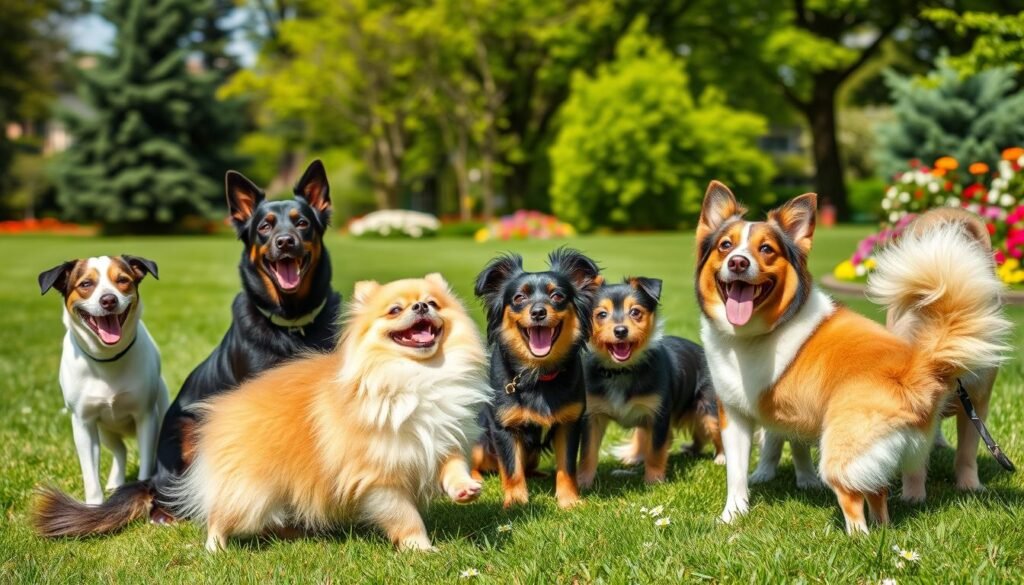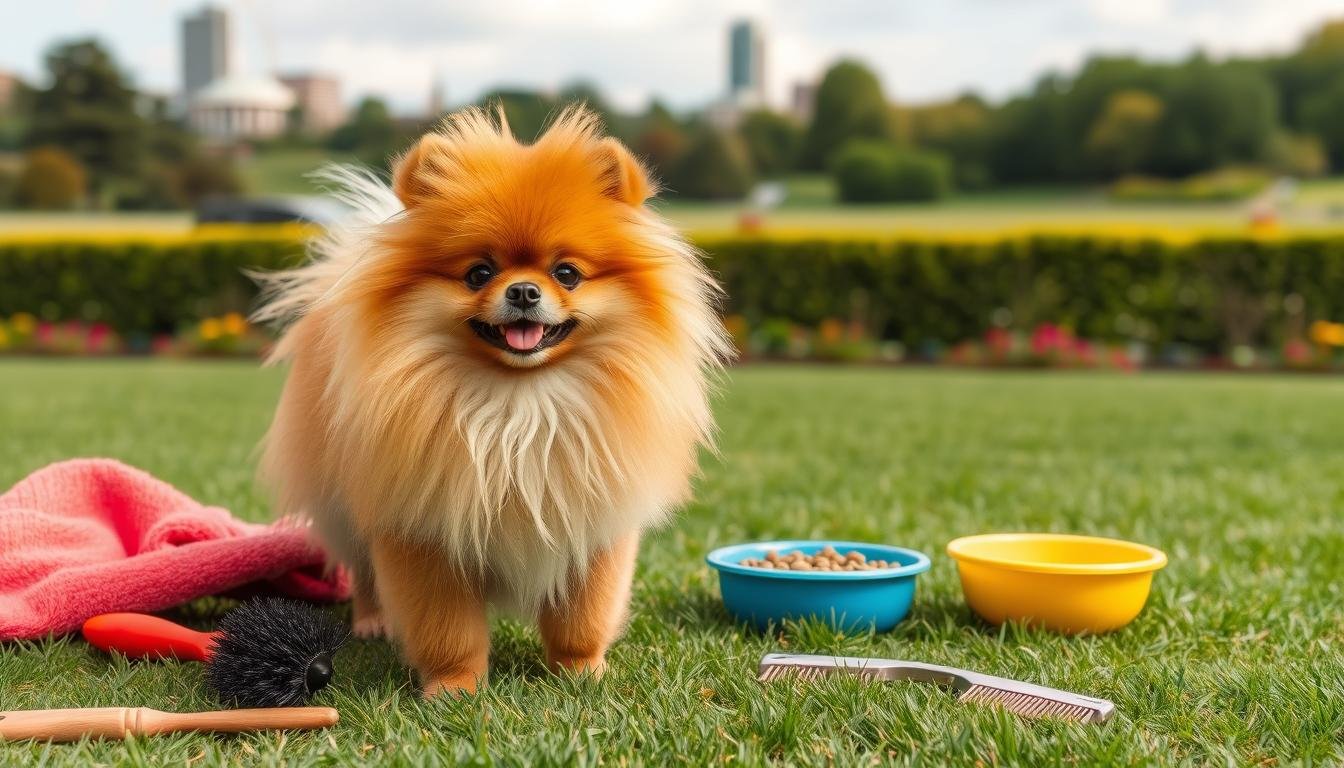As a proud Pomeranian owner, I’ve learned a lot about their care. These fluffy friends need special attention to thrive. Their looks, playful nature, and loyalty have won my heart. I’m excited to share what I’ve learned about caring for Pomeranians.
Key Takeaways
- Pomeranians are small dogs with a dense double coat that requires regular grooming.
- Proper nutrition, including a balanced diet with high-quality protein and limited fillers, is crucial for Pomeranian health.
- Daily exercise, such as brisk walks and playtime, helps prevent boredom and keeps Pomeranians well-behaved.
- Early socialisation and positive reinforcement training are essential for Pomeranians to become friendly and well-adjusted companions.
- Regular veterinary check-ups are vital for the early detection and prevention of common Pomeranian health issues.
The Distinctive Pomeranian Breed
The Pomeranian is a small but captivating breed with a rich history. They come from the Pomerania region in Europe. Originally, they were herding dogs and sled pullers.
But, their fame grew in the late 19th century. This was thanks to Queen Victoria’s love for the smaller Pomeranians.
In 1900, the American Kennel Club (AKC) officially recognised the Pomeranian. This made them a beloved toy dog. Today, Pomeranians are one of the most popular toy breeds worldwide.
Key Highlights
- Pomeranians are easily recognisable by their fox-like faces and curled, fluffy tails.
- Their double coat, consisting of a dense inner layer and a longer outer layer, gives them their distinctive fluffy appearance.
- Pomeranians require regular grooming to maintain their lush and healthy fur.
- The breed’s popularity has steadily increased, making them a common sight in homes and dog shows alike.
“Pomeranians may be small, but they have a big personality that captures the hearts of many.”
Understanding the Pomeranian Personality
Pomeranians are lively and spirited. They are smart and love to please their owners. But, they can be independent and stubborn at times. They need consistent, positive training to learn well.
Despite being small, Pomeranians have a big attitude. They are great watchdogs, alert and protective. Early socialisation helps them become friendly and well-adjusted.
Pomeranians are active and need regular mental and physical stimulation. They enjoy playing, exploring, and learning new tricks. Activities like walks and outdoor adventures keep them happy and well-behaved.
“Pomeranians are the perfect blend of big-dog attitude and small-dog charm.”
Knowing the pomeranian temperament, pomeranian personality traits, and pomeranian behaviour is important. It helps with their pomeranian trainability and overall happiness. By meeting their unique needs, owners can help Pomeranians reach their full potential.
The Ultimate Guide to Pomeranian Care: Grooming, Diet, and Exercise Tips
Grooming Essentials
As a Pomeranian owner, grooming is key to keeping your pet looking great and healthy. These lively dogs have thick, double coats that need regular care. This stops mats, tangles, and keeps their fur shiny.
Brush your Pomeranian’s fur a few times a week with a slicker brush and metal comb. This removes loose hair and spreads natural oils. It also stops mats from forming. Bathe them every 4-6 weeks with a gentle dog shampoo and conditioner to keep their coat soft.
- Pomeranian grooming: Brush their fur several times a week to avoid mats and tangles
- Pomeranian coat care: Use a slicker brush and metal comb to distribute natural oils and maintain a healthy, shiny coat
- Pomeranian bathing: Bathe every 4-6 weeks using a gentle, dog-specific shampoo and conditioner
- Pomeranian brushing: Regularly brushing helps to remove loose hair and keep your Pomeranian’s coat looking its best
Pomeranians don’t need haircuts often, but trimming around the paws, face, and other areas keeps them neat. By sticking to these grooming tips, your Pomeranian will stay fluffy and stylish.
Nutritional Requirements for Optimal Health
Keeping your pomeranian diet balanced is key for their health. Your Pomeranian’s diet needs change with age, activity, and personal health. Knowing what nutrients they need helps them stay healthy and happy.
Diet and Feeding Tips
Choose a pomeranian food with a main ingredient like chicken, fish, or lamb. Healthy fats from fish oil or flaxseed are good for their skin and coat.
- Stay away from dog foods with lots of corn, wheat, or soy. They don’t offer much nutrition.
- Don’t give your Pomeranian human food, as it can be bad for them.
- Watch how much you feed them to avoid weight gain and health problems.
Talking to your vet is a good idea for pomeranian feeding advice. They can help with the right pomeranian nutrition and how much to feed for your dog’s best health.
Exercise and Activity Needs
Pomeranians may be small, but they have lots of energy. They need regular exercise and mental challenges to stay happy. Without enough activity, they might get bored, destructive, or even gain weight.
To keep your Pomeranian fit, aim for 30 minutes of exercise daily. This can include walks, playtime, and training. Younger Pomeranians might need more, while older ones might need less. It’s important to find the right amount for your dog.
- Pomeranian exercise: Brisk walks, fetch, tug-of-war, and agility training are all excellent ways to meet their physical activity needs.
- Pomeranian physical activity: Incorporate puzzle toys, food-dispensing toys, and obedience training to challenge their minds and prevent boredom.
- Pomeranian playtime: Interactive games like chase, hide-and-seek, and “find the treat” can be both mentally and physically stimulating.
- Pomeranian mental stimulation: Teach your Pomeranian new tricks, practice obedience commands, and provide puzzle toys to keep their minds active and engaged.
A well-exercised Pomeranian is a happy and well-behaved one. Meeting their physical and mental needs helps them live their best life.
| Activity | Benefits | Recommended Duration |
|---|---|---|
| Brisk Walks | Physical exercise, exploration, and socialisation | 15-20 minutes per day |
| Playtime | Mental stimulation, bonding, and energy release | 10-15 minutes per day |
| Puzzle Toys | Problem-solving, food-seeking, and cognitive engagement | 10-15 minutes per day |
| Obedience Training | Positive reinforcement, mental challenge, and strengthened bond | 10-15 minutes per day |
Training and Socialisation Techniques
Pomeranians are smart and love to please, but they can be a bit stubborn. It’s important to start training early and be consistent. Taking them to obedience classes helps them learn commands and meet other dogs and people.
Early Training and Socialisation
For pomeranian training and pomeranian socialisation, keep it short and fun. Use positive rewards like praise, treats, and play. Avoid harsh discipline as it can harm their spirit.
It’s crucial to socialise your pomeranian puppy early. Introduce them to various sights, sounds, and animals. This boosts their confidence and prevents fear-based pomeranian obedience problems later on.
- Start pomeranian training and socialisation early, between 3-14 weeks.
- Enrol your Pomeranian in obedience classes for basic commands and socialising.
- Use positive reinforcement like treats, praise, and play to encourage good behaviour.
- Be patient and consistent, as Pomeranians can be stubborn.
- Socialise your pomeranian puppy by exposing them to different environments to build confidence.

Early pomeranian training and socialisation, along with positive reinforcement, help your Pomeranian become a well-adjusted, confident, and obedient friend.
Common Health Concerns and Prevention
Pomeranians, like all dogs, face unique health challenges. But, with the right care and prevention, many problems can be managed or prevented. Let’s look at common health issues in Pomeranians and how to keep them well.
Dental disease is a big concern for Pomeranians. These small dogs can get tartar and periodontal disease if their teeth aren’t brushed and cleaned. Not taking care of their teeth can cause pain and even tooth loss. It’s important to keep up with their dental care.
Eye problems, like entropion and dry eye, are also common in Pomeranians. Regularly checking their eyes for signs of trouble can help catch and treat these issues early. A vet ophthalmologist can provide the right care and prevention.
Hip dysplasia, where the hip joint doesn’t form right, is another issue. Keeping your Pomeranian at a healthy weight through diet and exercise can help prevent this. Regular vet visits and screenings can also catch problems early.
Building a strong relationship with a vet is key for your Pomeranian’s health. Regular check-ups, vaccinations, and care can keep your pet happy and healthy for a long time.
By being careful, creating a caring home, and following your vet’s advice, your Pomeranian can live a long, happy life. Remember, pomeranian preventative care and pomeranian veterinary care are essential for your Pomeranian’s pomeranian wellness and to handle any pomeranian health issues that come up.
Understanding Pomeranian Behaviour and Communication
Learning to read your Pomeranian’s body language and sounds is key to a strong bond. These lively dogs send out many subtle signals. Watching their tail, ears, and face can tell you a lot about their mood.
Reading Body Language
Pomeranians mainly talk through barks, but their body language is just as important. A wagging tail usually means they’re happy and excited. But a stiff, low tail might show they’re scared or worried.
When their ears perk up, they’re alert. But if their ears go flat, they might be stressed or feeling submissive. Also, look at their face. Squinting eyes or furrowed brows can show they’re upset.
Knowing these pomeranian behaviour and pomeranian body language signs helps you solve problems. Like too much barking or feeling left out. This knowledge makes your home a happier place for both you and your Pomeranian.
| Pomeranian Body Language | What It Means |
|---|---|
| Tail Wagging | Happiness and Excitement |
| Tense, Low-Hanging Tail | Anxiety or Fear |
| Perked-Up Ears | Alertness |
| Flattened Ears | Stress or Submission |
| Squinting Eyes or Wrinkled Brows | Emotional Distress |
By grasping your Pomeranian’s special pomeranian communication signs, you can strengthen your bond. And make a caring space that meets their needs and likes.
Safety Tips for Pomeranians in India
India’s varied climate poses a unique challenge for Pomeranian owners. These lively dogs, with their fluffy coats, need extra care for their pomeranian safety in India. Owners must consider their Pomeranian’s pomeranian climate concerns and pomeranian environmental considerations in both heat and cold.
In hot weather, Pomeranians face pomeranian heat safety risks. Offer them shade, fresh water, and a cool, airy spot. Use cooling mats or pads to help them stay cool. In cold areas, keep them warm with a snug bed and winter clothes.
Throughout the year, watch out for dangers in your Pomeranian’s world. Avoid toxic plants, standing water, and busy places for their safety. Regular vet visits are key to spotting and treating health issues early.
| Safety Consideration | Recommended Action |
|---|---|
| Heat | Provide shade, fresh water, and a cool, well-ventilated space. Use cooling mats or pads. |
| Cold | Ensure a warm, cosy bed and winterised outerwear. |
| Toxic Plants | Identify and avoid hazardous plants in your Pomeranian’s environment. |
| Standing Water | Keep your Pomeranian away from stagnant water sources. |
| Traffic | Exercise caution in high-traffic areas to prevent accidents. |
By focusing on pomeranian safety in India, you can ensure your Pomeranian thrives. With a bit of extra care and attention, your furry friend can live a safe and joyful life with you.
Puppy Care and Development
Adopting and Training Pomeranian Puppies
Getting a Pomeranian puppy is exciting and rewarding. These dogs are full of energy and love. They need careful care and early training to grow up well.
The best time to get a Pomeranian puppy is between 8 to 12 weeks. They are weaned, socialised, and ready to bond with their new family by then.
This time is key for socialisation and training. Puppies learn best during this period. They need to meet many people, pets, and places. This helps shape their personality and prevents future problems.
Training and socialisation are vital for Pomeranian puppies. Start with simple commands like sit, stay, and come. Use rewards and praise to encourage good behaviour. Regular, gentle training and lots of play and love will make your puppy confident and well-adjusted.
- Adopt Pomeranian puppies between 8 to 12 weeks of age for optimal bonding and training
- Socialise Pomeranian puppies during the critical 8 to 12-week period to expose them to new experiences
- Begin basic obedience training with Pomeranian puppies, using positive reinforcement techniques
- Provide Pomeranian puppies with plenty of playtime, affection, and consistency in training
| Puppy Care Considerations | Key Recommendations |
|---|---|
| Nutrition | High-quality puppy food formulated for their nutritional needs |
| Grooming | Regular brushing, bathing, and nail trimming |
| Exercise | At least 1 hour of exercise daily |
| Health Concerns | Monitoring for common issues like hip dysplasia and eye problems |

“Socialising your Pomeranian puppy is crucial for their development and well-being. Positive exposure to new sights, sounds, and experiences will help them grow into confident, well-adjusted companions.”
By adopting and training Pomeranian puppies in the first 8 to 12 weeks, you lay a strong foundation. Consistent, positive training and lots of love will help your puppy thrive.
Finding the Right Pomeranian Breeder or Rescue
Ready to welcome a Pomeranian into your home? It’s key to find a responsible breeder or a reputable rescue. A good breeder will check potential owners, offer health guarantees, and ensure puppies are socialised and trained. Rescues also match dogs with families, considering their temperaments.
Think about your lifestyle and living space before getting a Pomeranian. These dogs are lively and intelligent, but they need the right care. Choosing a responsible source ensures your new pet gets a great start.
Responsible Pomeranian Breeders
Look for these qualities in a Pomeranian breeder:
- Screens potential owners to ensure the puppies are placed in suitable homes
- Provides health guarantees and documentation on the puppies’ health and lineage
- Ensures the puppies are well-socialised and have received appropriate training
- Maintains a clean, safe, and caring environment for the breeding dogs and puppies
- Is happy to answer all of your questions and provide guidance on Pomeranian care
Adopting a Pomeranian from Rescue
Pomeranian rescue organisations are a great choice. They:
- Evaluate the dogs’ temperaments to match them with the right families
- Provide medical care, socialisation, and training before placement
- Offer support and resources to help you care for your adopted Pomeranian
- Ensure the dogs are spayed or neutered, vaccinated, and microchipped
- May have a range of ages available, from puppies to senior Pomeranians
| Pomeranian Breeder Checklist | Pomeranian Rescue Checklist |
|---|---|
|
|
Choosing a responsible pomeranian breeder or pomeranian rescue ensures your new pomeranian has a great start. They become a beloved pomeranian responsible ownership companion.
The Joys of Pomeranian Companionship
Pomeranians are loved for their charming personalities and beautiful looks. They are clever, alert, and loving. These traits make them great family pets, forming strong bonds with everyone.
They love attention and enjoy playing and learning. This makes them perfect for those who can give them lots of care and fun. Pomeranians fit well in many homes, big or small. With the right care, they become loyal and happy companions.
| Key Facts about Pomeranians | Value |
|---|---|
| Average Lifespan | 12 to 16 years |
| Monthly Expenses | ₹3300 to ₹5400 |
| Monthly Food Expenses | ₹1200 to ₹1800 |
| Maintenance Level | High |
| Ideal Adoption Age for Puppies | 8 to 12 weeks |
Pomeranians are full of energy and love to play. They are smart, loyal, and protective. Their small size is great for apartments, but they need lots of activity and mental games.
Starting early with socialisation and training is key. This helps them become well-adjusted and loving family members.
“Scooty’s video has inspired me to look into getting a wheelchair for my Pomeranian. It’s amazing to see the difference it can make in their quality of life.”
– Shannon Moreton, Pomeranian Owner
Pomeranians are a favourite toy breed worldwide, including in India. Their beautiful looks and loving nature make them a joy to have. They offer endless happiness and companionship, making them a great choice for a family pet.
Conclusion
The Pomeranian is a lively, energetic friend that needs lots of care. This guide has given you all you need to know. It covers grooming, exercise, and training to help your Pomeranian thrive.
Knowing the breed’s special traits, health needs, and behaviour helps a lot. You can make a great home for your Pomeranian. This way, they can grow and be their best self.
Being a Pomeranian owner is a big job, but it’s very rewarding. This guide has given you the tools to start a wonderful journey with your Pomeranian. With the right care and training, they will bring joy and happiness into your life.
The pomeranian breed overview tells you about their history and what makes them special. The pomeranian care summary covers grooming, diet, exercise, and health. By being a responsible owner, you can make sure your Pomeranian is happy and healthy.

